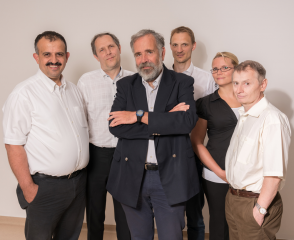
László Lengyel, director of BME Centre for University-Industry Cooperation and his team members
A new R&D service centre
The BME Centre for University-Industry Cooperation (BME FIEK) was established in 2017 as the joint project of several large corporations and the Budapest University of Technology and Economics. However, the cooperation between the university, Siemens, Richter Gedeon, Nokia Solutions and Networks and MVM Hungarian Electricity Company did not start at this point in time, they had been partners for decades. “We have implemented several successful research and development projects. Companies contact us raising questions they cannot respond to due to the lack of the necessary experiments they would need to do in addition to their daily tasks, and we together with the colleagues and students work in projects to find the right solution”- explained László Lengyel, director of BME FIEK. The cooperation aims to elaborate new procedures and solutions and it also provides practical training to students, who get to know their future working environment.
The NRDI Office decided to grant support to the project in 2016, it provided funding of HUF 3.96 billion and the participating companies together provide a further HUF 2 billion as their own resources. “On the one hand, the centre is a project supported by the Office, and also an independent organisational unit within the university, actually it is a central organisation, which serves the faculties like other central organisations within the university do” - said Lengyel. They consider themselves as a sustainable model of research organisation, a catalyst of the joint strategic cooperation between the university and businesses.
“Businesses have an opportunity to articulate their research, development and training needs for higher education, whereas the university in addition to its scientific activities may produce results that can be effectively utilised in practice, thereby they inspire the translation of theoretical knowledge into promoting industrial solutions to everyday issues” - says the director. The participants have long been searching for the opportunity to establish a model which may put their university links on broader foundations. The support provided by the NRDI Office fund gave a chance to institutionalise this new type of cooperation. Currently, they are focusing on two special areas, pharmacology and energetics, but they aim to extend the successful model to cover other areas, as well.
There will be five laboratories
Within the project they will establish five research-development laboratories. The first is the PharmaTech pharmaceutical technology laboratory supported by Richter Gedeon. In the laboratory, the primary activity will not be the development of new active ingredients but they will renew the current periodical technology of drug manufacturing. “Our general objective is to elaborate the complex and continuous pharma-technology concept, which is expected to bring about a safer and more competitive pharmaceutical process as a result” - he says. To this end, they apply real time sensing, data processing, immediate control in parallel with manufacturing based on computer models, analytical tools and artificial intelligence.
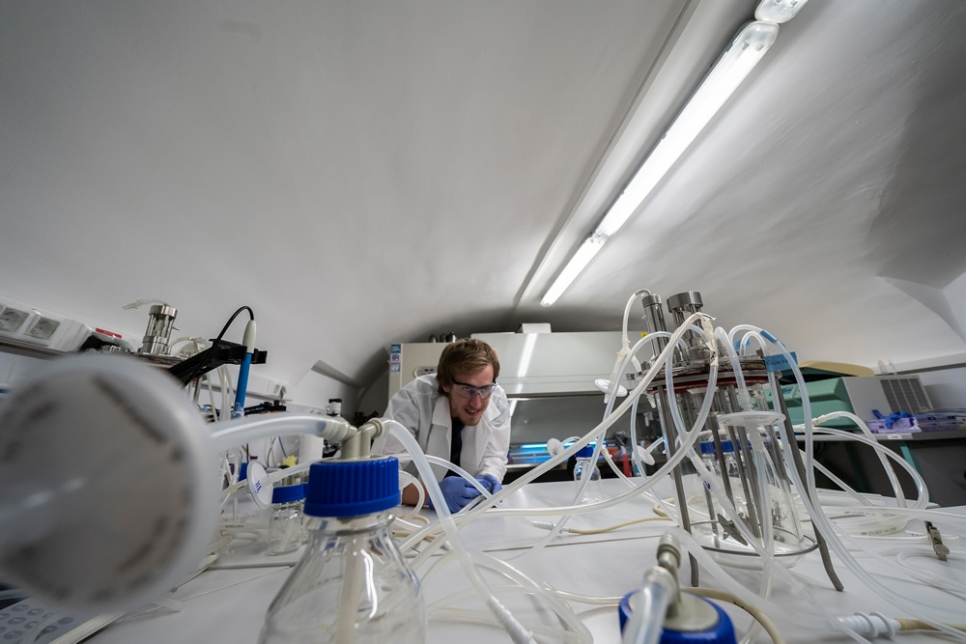 |
| PharmaTech pharmaceutical technology laboratory |
The second one is the Smart Power simulation laboratory established jointly with Hungarian Electricity Company, where increasing the security of supply, sustainable energy supply and energy efficiency are the research topics of decisive importance. “The real-time development and testing under laboratory circumstances of the energy management of the electric energy system largely based on renewable energy resources takes place here” - says Lengyel. In the Mikro-CHP laboratory they seek to use the energetic potential in the related energy production, which could be used by households: “For example, the boiler produces water of 40-50 degrees Celsius for heating, however, combustion needs a much higher temperature. The difference could also be used for the purpose of producing electricity” - explains Lengyel.
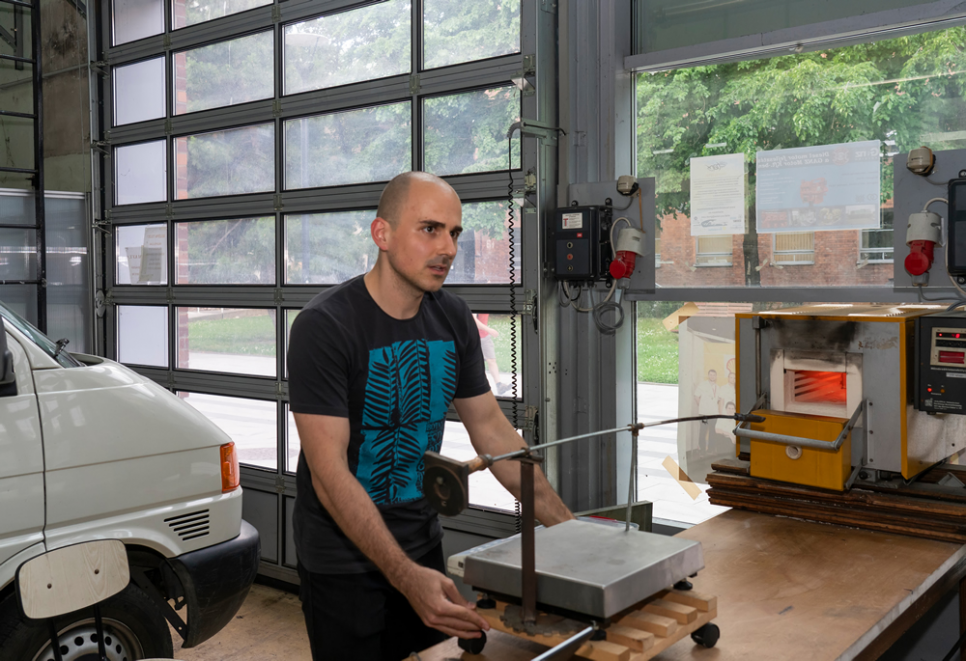 |
| Mikro-CHP laboratory |
The fourth laboratory is the Siemens modular, hybrid drives laboratory. This is the largest investment amounting to more than HUF 400 million, and the most time consuming of all, not only due to the time needed for public procurement procedures but because those public procurements are built on one another. In the model plant electric engines with a power of 300 kW performance and 5000 rpm, as well as every element of the drive train of electrically propelled vehicles and their combinations can be tested (engine, generator, converters, battery). The capacity of the laboratory will be unique in the region. “We will be able to simulate different types of use, which helps us gauge the abilities of engines” - explained the director.
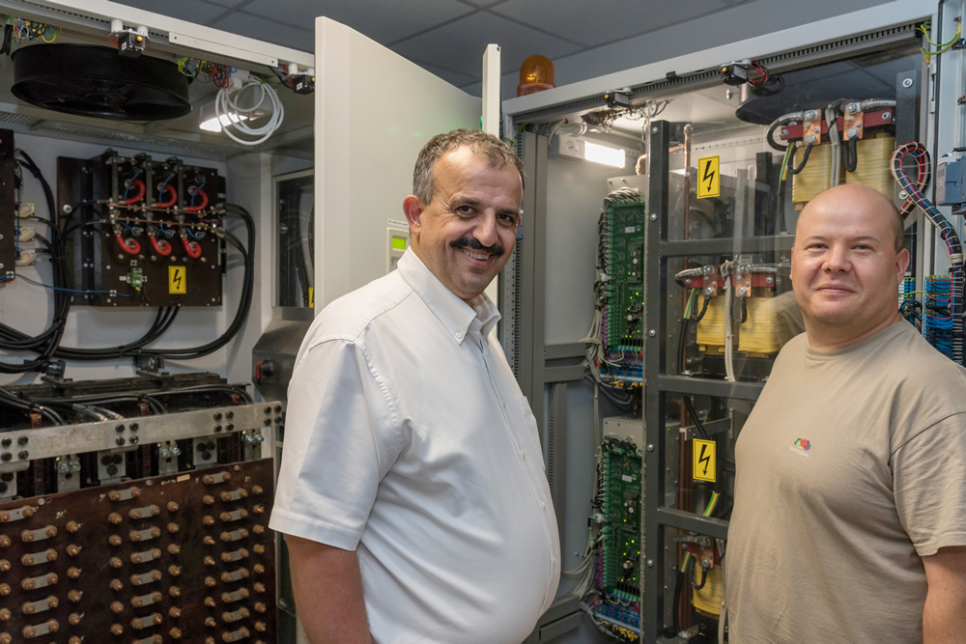 |
| Smart Power simulation laboratory |
The fifth is the ICT (information and communication technologies) laboratory, which by connecting the first four into a network, will provide a unified information platform for research and development activities. In the project digitalisation is not handled as a separate area, but as a horizontal support surface, which collects, analyses data and intervenes, if necessary. “Our whole life is made up of these three phases. We sense, i.e. gather information, which we store and think about, i.e. we process them and then act” - says Lengyel. The task of information technology is to make the work of laboratories and specific areas more efficient and more competitive. Four of the laboratories will start operating this year, however, the modular and hybrid drives lab due to its sizes and complexity will be operational in the first quarter of 2019.
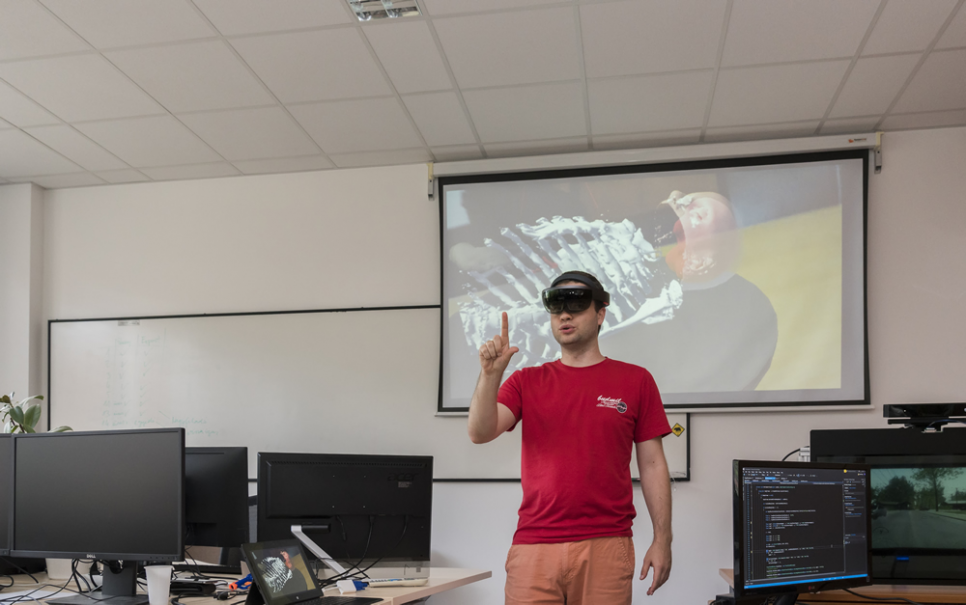 |
| ICT (information and communication technologies) laboratory |
Researchers should stay in place
It is not the objective of FIEK to deprive faculties of research-development work or engage researchers: to the contrary, it wishes to coordinate the knowledge and capacity of various faculties. “We would like our researchers to perform value-added tasks and high-level research-development activity here, on the spot, instead of going to other remote workplaces. This is a service attitude, which will contain elements that will make it attractive for them to stay in the academic environment. Human resources management will be replaced by a caring attitude” - explains Lengyel. FIEK shall discharge tasks which are not strictly professional and technical in nature: they will help channel the versatile research-development competence at the university through professional harmonisation, administration, exploring sources and relationships, promoting market entry, marketing and business coordination.
So far, researchers and students from the Faculty of Mechanical Engineering, the Faculty of Chemical Technology and Biotechnology, the Faculty of Electrical Engineering and Informatics, and the Faculty of Civil Engineering joined in the cooperation, which they also seek to expand by involving other faculties. Professional needs help to decide who participates in the cooperation. “We are about to provide R&D competences and capacity for the market” - he says.
They accelerate
The current project is running with the participation of the university and the four businesses mentioned above, at the same time we are about to service the industry as a whole, as a knowledge base. “We would like to attract market players and we wish to establish the link between industry and university in a more organised, more professional form. We started to work on a model which is sustainable. Research findings are important and equally important is the ability to think in the long run” - he says.
The centre does not have a special professional competence, it only enhances work done at faculties and coordinates knowledge and capacities. The operation within the university is regulated, the participation of students, researchers requires the consent of the head of department and the dean. The task of FIEK to harmonise becomes really important when an issue to be solved does not belong to one faculty or one department. BME FIEK is a model, a multi-disciplinary response given through the cooperation of different university faculties to complex challenges surfacing in industry.
According to Lengyel, the cooperation is already successful, more and more researchers, lecturers and students would like to participate in projects. “We are in the phase of acceleration, the centre is still young, but our great future has already been started. Specific results shall determine continuation, while implementing individual projects, we may encounter new thoughts, ideas, which we can explore and which can serve as the basis for further cooperation and R&D activities” - he says. According to Lengyel, the key to the future is similar cooperation between industry and universities: it is in the area of research and development where education and the market can complement each other in the most efficient way.
All over the country, several FIEK organizations have been established, several universities work together with similar centres. “We regularly communicate with several centres and we make efforts to learn from one another. We are glad to share the model we run at the BME with others, we help them establish the most efficient organisational structure and we hope that in the future this will be mutual.” There are several universities with high professional competences such as the Semmelweis University or the Budapest Corvinus University, where currently no FIEK operates. “Involving these institutions in the network offering R&D competence and capacity would be a great step forward as it would lead to even more enhanced capacities” - he says.






